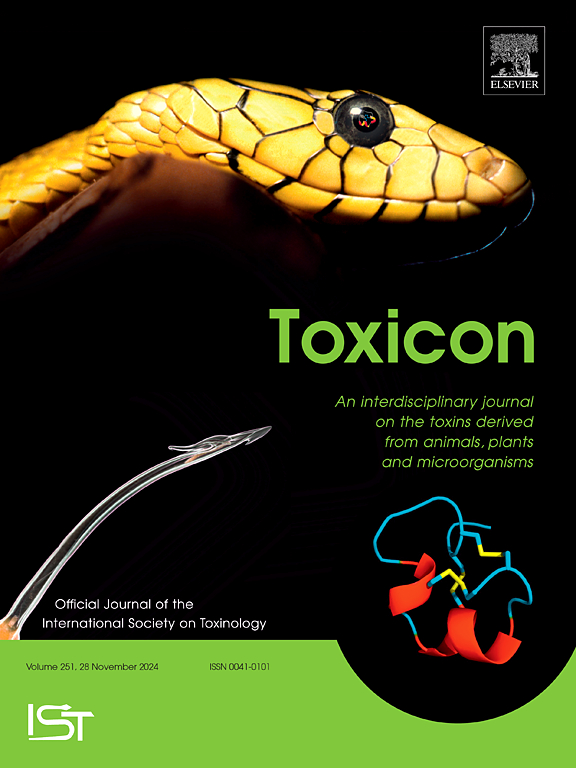教育医护人员在蛇咬伤管理:研究确定蛇咬伤生命支持研讨会的有效性。
IF 2.6
4区 医学
Q2 PHARMACOLOGY & PHARMACY
引用次数: 0
摘要
蛇咬伤中毒是一个重大的全球卫生问题,印度承担着沉重的负担。尽管制定了指导方针,但卫生保健工作者(HCWs)仍然存在知识差距和缺乏培训,导致高发病率和死亡率。本研究旨在评估蛇咬伤生命支持(SBLS)研讨会对医护人员在蛇咬伤管理方面的知识、实践、自我效能和倡导技能的影响。方法:于2024年5月在某三级保健中心的SBLS研讨会上进行介入前-后研究。在研讨会前后,采用标准化问卷和改进的一般自我效能(GSE)量表对医护人员的知识、实践技能、自我效能和倡导技能进行评估。数据采用SPSS v25.0进行分析,采用配对t检验和Wilcoxon符号秩检验进行比较。结果:41名医护人员完成了工作坊前和工作坊后的评估。在知识方面观察到显著的改善,特别是在避免20分钟全血凝血试验(20WBCT)结果假阳性(p=0.020)和抗蛇毒血清预用药方面(p结论:SBLS研讨会有效地提高了医护人员的知识、管理实践、自我效能和宣传意图,强调了将此类培训纳入医疗保健教育的必要性,以推动系统改变蛇咬伤管理并改善患者预后。未来的研究应侧重于长期影响和更广泛的实施。本文章由计算机程序翻译,如有差异,请以英文原文为准。

Educating healthcare workers in snakebite management: A study to determine the effectiveness of the snake bite life support workshop
Introduction
Snakebite envenomation is a significant global health issue, with India bearing a substantial burden. Despite the development of guidelines, knowledge gaps and lack of training persist among healthcare workers (HCWs), contributing to high morbidity and mortality. This study aimed to evaluate the impact of the Snake Bite Life Support (SBLS) workshop on HCWs’ knowledge, practices, self-efficacy, and advocacy skills in snakebite management.
Methods
A pre-post interventional study was conducted during the SBLS workshop at a tertiary care center in May 2024. HCWs’ knowledge, practical skills, self-efficacy, and advocacy skills were assessed using standardized questionnaires and a modified General Self-Efficacy (GSE) scale, both before and after the workshop. Data were analyzed using SPSS v25.0, employing paired t-tests and Wilcoxon signed-rank tests for comparison.
Results
Forty-one HCWs completed the pre- and post-workshop assessments. Significant improvements were observed in knowledge, particularly in avoiding false positive 20-min whole blood clotting test (20WBCT) results (p = 0.020) and premedication for antivenom (p < 0.001). Participants reported a marked increase in self-efficacy across all GSE parameters and demonstrated enhanced advocacy intent in resource management, policy influence, and educational outreach. The workshop influenced practice changes, notably reducing the administration of antivenom in confirmed hump-nosed pit viper bites.
Conclusion
The SBLS workshop effectively enhanced HCWs' knowledge, management practices, self-efficacy, and advocacy intentions, emphasizing the need for integrating such training into healthcare education to drive systemic change in snakebite management and improve patient outcomes. Future studies should focus on long-term impacts and broader implementation.
求助全文
通过发布文献求助,成功后即可免费获取论文全文。
去求助
来源期刊

Toxicon
医学-毒理学
CiteScore
4.80
自引率
10.70%
发文量
358
审稿时长
68 days
期刊介绍:
Toxicon has an open access mirror Toxicon: X, sharing the same aims and scope, editorial team, submission system and rigorous peer review. An introductory offer Toxicon: X - full waiver of the Open Access fee.
Toxicon''s "aims and scope" are to publish:
-articles containing the results of original research on problems related to toxins derived from animals, plants and microorganisms
-papers on novel findings related to the chemical, pharmacological, toxicological, and immunological properties of natural toxins
-molecular biological studies of toxins and other genes from poisonous and venomous organisms that advance understanding of the role or function of toxins
-clinical observations on poisoning and envenoming where a new therapeutic principle has been proposed or a decidedly superior clinical result has been obtained.
-material on the use of toxins as tools in studying biological processes and material on subjects related to venom and antivenom problems.
-articles on the translational application of toxins, for example as drugs and insecticides
-epidemiological studies on envenoming or poisoning, so long as they highlight a previously unrecognised medical problem or provide insight into the prevention or medical treatment of envenoming or poisoning. Retrospective surveys of hospital records, especially those lacking species identification, will not be considered for publication. Properly designed prospective community-based surveys are strongly encouraged.
-articles describing well-known activities of venoms, such as antibacterial, anticancer, and analgesic activities of arachnid venoms, without any attempt to define the mechanism of action or purify the active component, will not be considered for publication in Toxicon.
-review articles on problems related to toxinology.
To encourage the exchange of ideas, sections of the journal may be devoted to Short Communications, Letters to the Editor and activities of the affiliated societies.
 求助内容:
求助内容: 应助结果提醒方式:
应助结果提醒方式:


